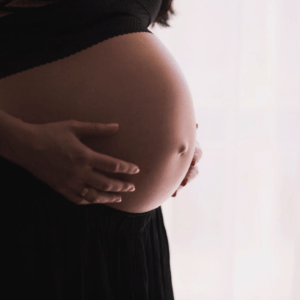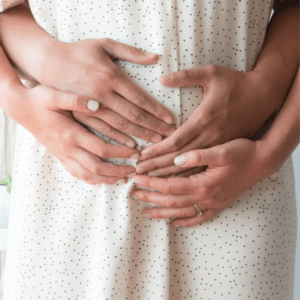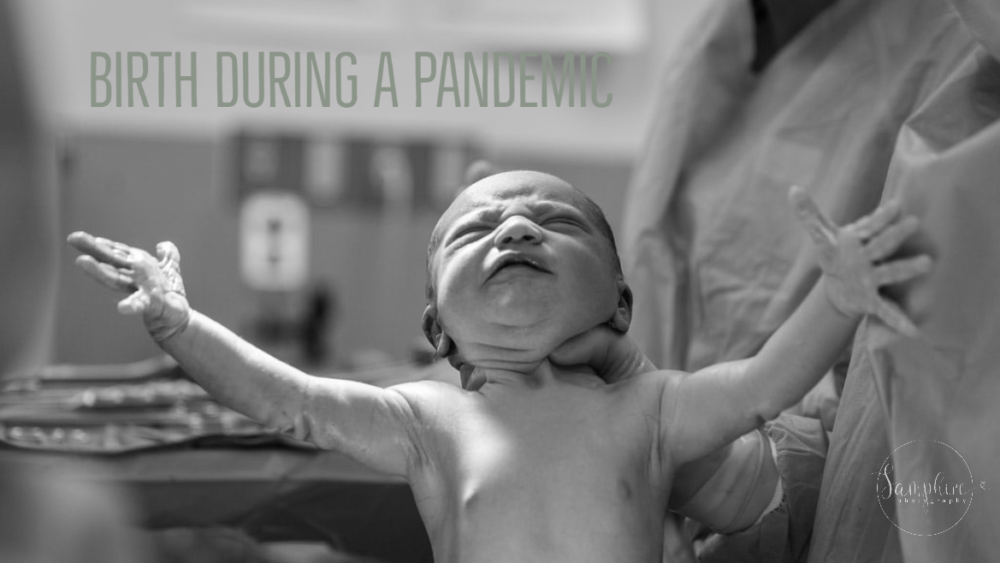I am a mother to three wonderful children, each safely born in a hospital, and can talk at length about my birth experiences. I can advise you on what to pack in your hospital bag, and tell you things I wish I knew before becoming a mum. However, I did not give birth during a pandemic. And that, potentially, changes everything: the time spent on the ward, the interaction with staff, who you can have with you as a birthing partner, etc. All this can make such a miraculous life event seem far more daunting than usual, causing anxiety and worry.
At the beginning of April I set up a Facebook group, Calmer Times: a support group for pregnant ladies and new mums. As a maternity and newborn photographer I work with a lot of pregnant women and new mothers, and felt that it would be comforting and beneficial for them to be able to safely interact with other women in the same situation. Since the group started, some of the babies have been born, and I asked the new mums to tell me about their experiences of giving birth during a pandemic. My thanks to them for letting me share their stories.

Meet the Mums
Lucy, gave birth at the Princess Royal Hospital, Haywards Heath. Hers was classed a high-risk pregnancy as she had to have a cervical suture at 12 weeks. The suture was taken out at 37 weeks and her baby girl arrived at 40 weeks.
Mrs P, gave birth at St Richards, Chichester. Her pregnancy was straight forward until the 28th week when a blood test showed her iron level and blood platelets count were low. Her platelets count kept dropping and so the pregnancy became high risk. This meant she couldn’t have the home birth she had planned to have. Her baby girl arrived at 37 weeks.
Emma, also gave birth at St Richards, Chichester. She was diagnosed with low PAPP-A* at 12 weeks, so needed to have extra checks as well as growth scans from 30 weeks. Her baby was a planned elective section.
Joanna, gave birth at East Surrey Hospital, Redhill. Her pregnancy was considered high risk due to her having a type 1 diabetes. In addition, hers was considered to be a geriatric pregnancy**. She had been due to give birth at King’s College Hospital in London, the leading hospital for treatment of diabetics in the nation. However, at the end of April King’s was in the epicentre of the Covid-19 epidemic. So when, at week 36, it was decided that baby should come at week 37 due to her size, it was at this point Mrs S and her husband decided to switch to East Surrey Hospital. “Within a week of us saying that we wanted to switch hospitals I was having a planned c-section at ESH. The transition was amazing. They immediately put me under the care of their diabetes team, booked me with Horsham midwives, had me come in to meet with the consultant and found undetected low iron levels which they treated pre-birth.”
This is the second baby for all four mums.
What was your labour like?
Lucy: Labour was fine, waters broke at 10pm, contractions started straight away and got stronger through the night, arrived at hospital at 5am and she was born at 5.31am….so very quick!
Mrs P: At 37 weeks 1 day at 7am I woke up to my waters breaking. I called the hospital and they invited me in to confirm it was my waters. After they did this they sent me home as my contractions hadn’t started yet. They said if labour doesn’t start until 7pm that evening they will induce me, as due to the pandemic instead of 24 hours they only wait 12 hours from the time waters broke to induction. So I returned to the hospital at 10pm where I was put onto CTG and then got prostaglandin gel to ripen my cervix. It wasn’t very effective, other than random tightenings, I still didn’t have real contractions. At 5am in the next morning I was transferred to the labour ward to be induced. Once I was in the delivery room I could call my husband in as before he wasn’t allowed to stay with me. They put me onto the drip around 6. Contractions started very slowly, so they kept increasing the oxytocin. As I was induced I wasn’t allowed to eat during labour and had to be monitored throughout the whole labour which made moving around and changing positions a lot trickier. I had two midwives supporting me as one of them just returned to work from her maternity leave and wasn’t allowed to work on her own yet. They were both very nice but quite chatty which was a bit disturbing when the contractions became more and more intense. Around midday they checked how was my labour progressing and was told I was 5cm dilated. Just after 1pm I felt the surge to push and within 6 minutes my little girl was born at 13.16.
Emma: [It] was a planned elective section but due to going into labour a few days before my planned date it actually became an emergency section.
Joanna: It was a planned c-section, due to baby’s size.
When your labour started did you call the hospital first, or did you go straight in?
Lucy: I rang to inform the hospital my waters had broken. They said as it was the night not to go straight in but keep them posted. We rang at 3am to try to go in and they suggested that my contractions didn’t sound strong enough. My husband then rang at 4am and they said to go in. We arrived about 4.55am
Mrs P: I called hospital when my waters broke, then went in to confirm it, then called them again in the evening to let them know contractions hadn’t started yet and they invited me in for induction on the same day at 10pm.
Emma: I called them after about 4 hours as contractions were becoming more intense, I was hoping to start with it was just Braxton Hicks so tried to have a bath and lay down to stop them.
Who was your birthing partner and were they allowed at just some parts of the birth or allowed all the time?
Lucy: When we arrived we were asked to stay outside the delivery ward, after about 5 minutes someone came and collected me but said my husband had to stay outside until they confirmed I was in established labour. He made it into the [delivery] room with 5 mins to spare.
Mrs P: My birthing partner was my husband. He wasn’t allowed in the hospital other than taking my bags up to the entrance of the ward I stayed in, and then the following day he could come in once I was in the delivery room. He stayed there with us for a few hours after giving birth whilst I was still on the drip but then had to leave when I was transferred to the postnatal ward.
Emma: Unfortunately due to the pandemic we didn’t have safe childcare, so I did it alone while my husband looked after our two year old son.
Joanna: It was my husband, Andy. He was allowed in with me in the c-section and for 2 hours post-surgery before I was taken back to the ward.

How was the labour in terms of help from staff/midwives?
Lucy: I got taken through, had my blood pressure taken and was left to wait for a midwife to come and assess me. Whilst waiting on my own I got stuck on the toilet (funny looking back but scary at the time) as I felt her head drop, I managed to get to the buzzer in the room and had the midwife come in and deliver my little girl. So in terms of commenting on the midwife I actually only had a midwife during my labour for 12 mins of stage 2 and 13mins of stage 3! The midwife was very calm when she came in and provided clear instructions to help me deliver
Mrs P: All staff, doctors and midwives I met during my stay were very nice and friendly. The two midwives I had during my labour and birth were also very friendly, supportive and they made me feel safe. However if I’m being honest, I didn’t really feel being in centre of their attention. At the beginning me and my husband enjoyed joining in the conversation and it was nice talking to someone after being in lockdown for weeks but later on it became quite disturbing for me listening to them. I just felt I couldn’t get into the zone, into my little bubble and focus inside properly no matter how hard I tried. I also had to initiate changing positions instead of being advised or encouraged. But other than this they were great and friendly and they delivered my baby safely. The care at the postnatal ward was amazing though to finish on a positive note.
Emma: The midwives, theatre and healthcare staff were all amazingly friendly and supportive!
Joanna: We couldn’t have been more impressed with the help from staff and midwives. Our midwife, Joanna, took absolutely amazing care of us all day and completely made us feel at ease. The doctors and anesthetist in the theatre for my surgery were all very communicative and supportive of me. Couldn’t fault anyone.
How was the labour for you emotionally?
Lucy: Emotionally….a rollercoaster in 20mins! I felt very alone and scared in the labour room on my own and my husband felt worse than I did being stuck outside not being able to support me. He made it into the room with 5 mins to spare, so neither of us quite got the experience we thought we would with the delivery. I was in shock once she had been delivered.
Mrs P: During my pregnancy I tried my best to prepare myself for the birth, read a few books on hypnobirthing and practised meditation, visualisation and breathing techniques. Breathing techniques helped me through my first birth so was determined to master them again before birth. Starting with the low platelets count and becoming high risk then the pandemic kicking off, to my waters breaking but contractions not starting I felt I had to let go all my notions of the last weeks of my pregnancy, birthing in the birthing centre, having a water birth etc.. all of these made it difficult to me to stay positive and had to work hard to accept the changes emotionally. Once I was in the delivery room I had a better mindset and with the help of my husband and the breathing techniques I learnt and practised I could stay positive and focused on what is really important. I was very determined to have this baby as naturally as possible and to let my body do what it needed to do to help my baby being born safely.
Emma: It was difficult, knowing my husband wasn’t there and wouldn’t meet our son until after I was discharged was incredibly sad, which weighed on me. I focused on our son arriving safely and finally being done with a difficult and very worrying pregnancy, and to get home and start our life as a family of four.
Joanna: It was a bit daunting going into the experience knowing that my husband would only be there for a very short time but the staff were so supportive that it wasn’t nearly as hard as I thought it was going to be.
What was your overall feeling about the experience in the labour ward? Do you think the current pandemic affected your birth experience in any way or way or was it the same as before?
Lucy: The one thing that would have made it better is if my husband hadn’t been asked to leave me, or if they did need that to happen for a member of staff to stay with me! I’ve hated having a baby during this time, it has really ruined the experience for my husband and I as we wanted to do everything together and he’s been unable to attend appointments, just about made the labour and then had to leave us alone when we went to the ward. I asked to get out as quickly as possible as I felt my husband was missing out on the first precious moments, if it had not been for the pandemic I prob would have stayed in overnight or at least enjoyed the time I was in, rather than clock watching!
Mrs P: To be honest, I’m not quite sure what to say. Obviously I’m very grateful and happy as my baby girl was born safely, naturally without any pain relief. I felt safe and felt in control but because of the things I mentioned above I’m also a bit disappointed. But it was great having the golden hour for ourselves, it was good they let baby rest on me for hours before they did the newborn checks and they helped with breastfeeding instantly. Also helped me having a shower, however the shower was broken so had to leave the room and find an other one which also didn’t work properly ha-ha! [The pandemic] didn’t have such a huge impact on it, only a few little things were different. As I mentioned before my husband couldn’t come in and stay other than for the delivery, or having to be induced sooner than I would have been. The biggest difference was probably the staff having to wear PPE all the time and not being able to see their faces properly. For me it was especially challenging as English is not my first language and I didn’t realise how much I rely on lip reading until I met someone wearing a mask
Emma: Really positive, I was hugely worried if I would cope with doing it alone and being in a hospital during a pandemic but with the care and support of the labour ward, it being quieter and them obviously taking such care with their PPE and distancing really eased my mind. I actually think it was more positive this time in some ways as with limited visitors and in some cases no visitors at all really got the ladies on the ward interacting and chatting with each other rather than being in the bubble of their cubicles.
Joanna: [As it was a planned c-section] I didn’t go to the labour ward. As mentioned previously it was sad for me that my husband couldn’t be with me on the post-natal ward. I was also looking forward to having our 4 year old meet her baby sister in the hospital. When I came home from hospital I had had bonding time with baby that my husband hadn’t had a chance to get, so it took him a few days to feel connected to her. Besides that, everything else was fine.

How long did you stay in hospital post birth?
Lucy: She was born at 5.31am and after waiting hours for the doctor to sign her off we managed to escape at 5.30/6pm.
Mrs P: My daughter was born on Saturday lunchtime and we went home on Sunday early afternoon. However we were back in hospital after a few days for 5 more days due to jaundice and because I had some kind of infection.
Emma: 24 hours, I was chomping at the bit to get home!
Joanna: I gave birth via c-section on the morning of Wednesday and was discharged the next night at 10 pm so I was there about 36 hours.
If you could give one piece of advice to women that will be giving birth soon, what would you say?
Lucy: Try and enjoy the experience even in these crazy times and do make sure you get the support you need before leaving hospital.
Mrs P: My advice would be to keep an open mind but be brave to speak up and stand up for yourself if you’re not happy with something. Also to try to focus only on you and your baby and let your birthing partner be your advocate so you can stay in your bubble.
Emma: Just relax, don’t focus on the strange world we are currently in, just focus on your new family member and everything will be ok!
Joanna: I think you’ll be pleasantly surprised by how quickly you forget about Covid-19 when you’re on the ward. You quickly get used to seeing the doctors and nurses in masks and soon forget about the craziness that is happening in the world outside. All of the doctors and nurses are aware of how scary it is for the women coming onto the wards and they were very kind and supportive.
Is there anything else you would like to add?
Lucy: Postnatal support has been non existent. No midwife or health visits which worries me as my daughter is now 5 weeks old and no one has really checked her at all since she was 8 hours old!
My thanks to Lucy, Mrs P, Emma and Joanna for their time and honesty. I hope their stories have been helpful xx

*What is PAPP-A?
Pregnancy Associated Plasma Protein A (PAPP-A) is produced by the placenta and is one of the hormones measured during the combined screening test. Studies have shown that low levels of PAPP-A may be associated with the placenta not working as well as it should do. This can lead to some babies not growing as expected. Low levels of PAPP-A can also be associated with Down’s Syndrome.
** Advanced Maternal Age (AMA) or geriatric pregnancy
The term geriatric pregnancy is a medical term used for any woman who gets pregnant after they turn 35. More modern terminology would describe the mother as of advanced maternal age. Technically speaking, over the age of 35, this is considered a “high risk” pregnancy, but only because overall pregnancy-related complications are higher than for women in their late 20s and early 30s. Studies have shown that women who postpone childbearing to after 35 do face some special risks, but that doesn’t mean you are destined to have a problem pregnancy.
Birth During a Pandemic




Comments are closed.